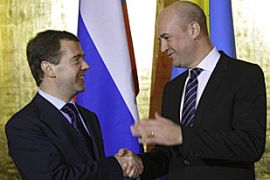EU and Russia move to mend ties
Talks in Sweden focus on energy security, climate change and trade.

During the talks, the EU pressed Medvedev for more assurances on energy supplies to the continent and also for a bigger commitment to climate change ahead of a crucial UN global warming conference in Copenhagen next month.
Trade body intentions
European officials had also been seeking clarification of whether Russia was intending to join the World Trade Organisation (WTO).
But after the talks, Medvedev said Russia had still not decided yet whether it wants to join the WTO as a separate country or together with Kazakhstan and Belarus, its partners in a three-way customs union.
“In my opinion both ways are possible,” he told a news conference in Stockholm.
“For us the main thing is speed. Whatever way is faster we will take it.”
Medvedev said Russia would make up its mind soon, but gave no details.
Earlier on Wednesday, Vladimir Chizhov, Russia’s ambassador to the EU, had said Russia would join the WTO as a separate entity.
Ahead of the Copenhagen summit, Fredrik Reinfeldt, the Swedish prime minister, whose country currently holds the rotating EU presidency, told Medvedev that Russia must curb its greenhouse gas emissions.
Russia has said it is willing to cut emissions by 10-15 per cent from 1990 levels, while EU members are committed to 20 per cent reductions by 2020.
Human rights concerns
Reinfeldt was also critical of Moscow’s human rights record, saying that the situation in Russia is an “increasing cause for concern”.
Human rights groups, including Memorial in Russia and the US-based Human Rights Watch, had earlier urged the EU presidency to pressure Moscow on human rights.
In a statement, they accused Russian authorities of neglecting to investigate recent killings and kidnappings in the Caucasus, allowing an atmosphere of “impunity” to flourish.
Relations between the EU and Moscow hit a low during Russia’s war with Georgia in August 2008 and Moscow’s decision in January to halt natural gas deliveries because of a dispute with Ukraine, leaving millions of EU citizens in the cold.
Friction over energy supply issues is thought to have been lightened by Stockholm’s recent decision to let the Russian-led Nord Stream gas pipeline pass through its economic zone of the Baltic Sea.
“This project is mutually beneficial … [and] aims to make European energy supplies more diversified,” Medvedev said on Wednesday.